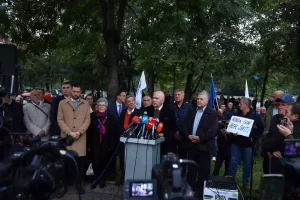Savez iz očaja – EU i bosanskohercegovačke političke „elite“

Uvodničar: Kurt Bassuener, suosnivač i viši saradnik Vijeća za politiku demokratizacije, Berlin
Sesija Kruga 99, nedjelja, 5. Jun. 2022.
Izjava za medije
Naslov moje uvodne riječi za današnju diskusiju na Krugu 99 odnosi se na ono što je evidentno zajednički interes bh. političke klase i EU da se dođe do nekog prilagođavanja u pogledu izbornog zakona / „ograničene ustavne reforme“, uprkos – ili bolje rečeno, zbog – ponovljenog neuspjeha do danas.
Za dominantne političke lidere u BiH, posebno lidera HDZ BiH Dragana Čovića, očaj je očigledan i opipljiv. Jasno mu je da se u BiH njegov prozor mogućnosti zatvara u zaključavanju hermetički zatvorene verzije feudalizma vođenog etničkim partijama. Njegovu dugogodišnju prijetnju spriječavanja održavanja izbora podržava Zagreb, a HDZ je istu ideju gurao na dnevni red kroz klub zastupnika EPP-a u Evropski parlament – za sada bezuspješno. Prijetnja predsjednika Hrvatske, Zorana Milanovića da spriječi poziv Švedske i Finske u NATO – iako, koliko ja razumijem, nije u okviru njegove ustavne ovlasti – pokazuje kako se u većini hrvatskog političkog spektra na BiH gleda isključivo kroz etničku prizmu.
Ipak, EU također zrači očajem za nekom vrstom “dobitka”, o čemu svjedoči posjeta predsjednika Evropskog vijeća Charlesa Michela. Sve što bi označilo napredak na “evropskom putu” za BiH bi se navelo kao dokaz da dugogodišnja neuspješna politika proširenja EU ovdje u BiH – čak I u cijelom regionu – ne propada. Tolika količina uloženog transatlantskog političkog kapitala posvećenog pitanju izbornog zakona do danas nije dala ništa; izgleda da su poruke iz SAD-a i UK-a sada fokusirane na osiguravanje da se izbori održe na vrijeme, I u cijeloj zemlji. Ali izgleda da je stav EU namjera da sebi prikupi dokaze o svojoj hvaljenoj “transformativnoj moći”, a ne za korist BiH ili narode Zapadnog Balkana. Ovosedmični sastanak Upravnog odbora Vijeća za implementaciju mira vjerovatno će pokazati ova trvenja.
Ovo je posebno uznemirujuće s obzirom na tektonski pomak koji je ubrzan ruskim napadom na Ukrajinu u punom obimu od 24. februara. Od tada je bilo neviđenih demonstracija zapadnog jedinstva i uobičajenih deklaracija o važnosti demokratskih vrijednosti i ljudskog dostojanstva u zapadnom diskursu. Uporni otpor i odlučnost Ukrajine, koje je tako vješto predstavljao i artikulirao predsjednik Volodomir Zelenski, uvelike su odgovorni za ovaj fenomen. Uprkos brojnim spočitavanjima, ovo jedinstvo i podrška – koliko god kasni i neorganizovani bili – za samoodbranu Ukrajine su važni I veći su od onog u šta je Putin, kao i mnogi od nas, sigurno vjerovali.
Pa ipak, uprkos ovom nepobitnom pokretu zajedništva, to tek treba da se manifestuje u bilo kojoj meri na Zapadnom Balkanu. Ako se ujedini, Zapad ima najveću polugu i najširu moguću kutiju alata u ovom regionu da utiče na dinamiku, spriječi i odvrati negativna dešavanja, i omogući napredak tamo gde se može razviti prirodni, životni podsticaj. Više od jedne decenije, različite percepcije prijetnji bile su evidentne i kvalifikovale su to potencijalno jedinstvo. Pa čak i sada, uprkos deklarativnom prepoznavanju potencijala rizika, Zapad i dalje dozvoljava da agendu određuju najretrogradniji i najreakcionarniji politički akteri – i to ne samo u BiH.
Alliance of Desperation: the EU and BiH’s Political “Elites”
Kurt Bassuener, Senior Associate, Democratization Policy Council
Discussion with Krug 99
Sunday, June 5th, 11am
Talking Points
The title of my opening statement for today’s discussion with Circle 99 refers to what is evidently a common interest of BiH’s political class and the EU to come to some accommodation regarding the election law / “limited constitutional reform,” despite – or rather, because of – repeated failure to date. For BiH’s dominant political leaders, especially HDZ BiH leader Dragan Čović, the desperation is obvious and palpable. He sees his window of opportunity closing to lock-in a more hermetically sealed version of ethnic party-led feudalism than BiH already has. His longstanding threat to prevent elections from being held has been backed by Zagreb, with the HDZ pushing the agenda in the EPP ranks and the European Parliament – without success, thus far. President Milanović’s threat to prevent Sweden and Finland from being invited to join NATO – while to my understanding not within his constitutional power – serves to demonstrate how for most of the Croatian political spectrum, BiH is viewed solely through the ethnic lens.
Yet the EU also radiates desperation for some sort of “deliverable,” as evidenced by European Council President Charles Michel’s visit. Anything to signify progress on the “European path” for BiH would be cited as evidence that a long-failing EU enlargement policy here in BiH – indeed regionwide – is not failing. The amount of transatlantic political capital devoted to the election law issue has yielded nothing to date; the messaging from the US and UK now seems focused on ensuring elections are held on time and throughout the country. But the EU posture seems intent on grasping for some evidence to prove its vaunted “transformative power” to itself, not to BiH or Western Balkan peoples. This week’s meeting of the Peace Implementation Council Steering Board will likely showcase these frictions.
This display is particularly jarring given the tectonic shift precipitated by Russia’s full-scale assault on Ukraine since February 24th. Since then, there have been unprecedented demonstrations of Western unity – and regular declarations about the primacy of democratic values and human dignity in the Western discourse. Ukraine’s staunch resistance and determination, so ably represented and articulated by President Volodomyr Zelenskyy, is largely responsible for this phenomenon. Despite numerous caveats, this unity and support – however late and spotty – for Ukraine’s self-defense is greater than certainly Putin, as well as many of us, would have believed.
And yet, despite this undeniable movement, this has yet to manifest itself to any considerable degree in the Western Balkans. If united, the West has the greatest leverage and widest possible toolbox in this region to affect the dynamic, prevent and deter negative developments, and enabling progress where the organic impetus for it can develop. For well over a decade, divergent threat perceptions were evident and qualified that potential unity. But even now, despite declarative recognition of the risk potential, the West continues to allow the agenda to be set by the most retrograde and reactionary political actors – and not just in BiH.
How to correlate the dissipation of popular confidence in the EU enlargement process with recent polling showing support for the goal of EU membership? Because it’s aspirational, about desired destination. The problem has never been whether the EU is a desirable address (or deep pockets donor/funder). Rather, it’s whether the EU can be seen as a credible policy actor, willing to exert influence (and where needed, power) to affect developments. It’s here where these is a dearth of confidence. And this is a rational deduction, based on experience.
While unity in response to Russia’s invasion of Ukraine ought to be an unalloyed positive, we have already seen it deployed, as in Putin’s chosen martial art of judo, against actual democratic solidarity and values. This was evident in BiH’s case when Hungary used the desire to maintain visible unity as leverage to gut the EU’s restrictive measures (sanctions) mechanism, in cooperation with Zagreb. Instead of confronting Budapest, the EU member states which had voiced desire to sanction Serb member of the BiH Presidency Milorad Dodik – the Benelux countries, Germany, and Czechia, accepted the shift from QMV to consensus voting. This was also evident in the compromise that Germany made with Croatia on the Strategic Compass language (on constituent peoples). Despite all the proclamations of Germany taking a strong stance in BiH and the rest of the Balkans, it has yet to be manifest in discernible policy.
I would argue that this is a demonstration of the direction of transformation. Rather than EU norm-setting, Western Balkan political norms – via Hungary and Croatia (and until recently, Slovenia) – have entered into EU mechanisms. The most recalcitrant and single-minded set, or at least shape, the agenda. Milanović and Erdoğan are also demonstrating this.
As Bojan related when I chose my title a few days ago, desperation is also manifest from citizens of BiH. As my DPC colleague Valery Perry, dear friend Senada Šelo Šabić, and seven other Bosnian and Macedonian colleagues wrote, the options for citizens are to sell out, tune out, get out, or freak out. Since I returned to Sarajevo after more than five years in Scotland, I can sense the energy drop, the reduced population density. There was a nervous hedonistic vibe when I left in 2016. That has dissipated now. That’s a parallel with Lebanon… This was once a society with a surfeit of self-respect. I didn’t experience that directly, in real time. But it was in my lifetime. I feel a void of popular self-respect now. Sadly, I feel the same in the US, but without the advantage that Bosnians of all self-descriptions can give on how we got to our current state…
Most frustrating to me is that the West continues to squander the advantage of its structural position of time. We don’t need to rush for results – my friend and former boss Dan Serwer has articulated this repeatedly, by the way. To be sure, time is not on BiH’s side. But the lack of solidity of the West’s posture has facilitated the grip of entrenched political power and its disintegrative potential. Were it clear that we would be staying in BiH to enforce the Dayton rules (and post-Dayton institution-building) until there is a “social contract for the 21st Century” – something I would posit that the West needs as well! – then it would be much harder for the established political class to leverage fear and extract patronage. We could then have the discussion that BiH needs: “what kind of country do we want to live in?” As of now, the whole predicate is about projecting catastrophe and arguing that it needs to be forestalled – naturally by giving those who could initiate it what they want… The fact that all seems possible supports this marketing strategy. The West could deflate it, but has consistently chosen not to, deciding that appeasement is preferable to confrontation.
We ought to be clear about the people we are dealing with – not elevate them into towering figures. They are creatures of a structure designed to work for their kind; of course they seek to optimize it further. But they reflect the incentives; they take the shape of their container. While I have no respect for them, it’s difficult for me to get too animated by their loathsome antics. They do what they can get away with. That so much policy attention has been lavished on such a small-time, banal crowd of rent-seekers brings to mind the rant by Ewan MacGregor’s character Renton in “Trainspotting:” “Some people hate the English – I don’t. They’re just wankers. We, on the other hand, are colonized by wankers…we’re ruled by a few assholes…” The EU-led policy toward BiH has been colonized by a transparent and shameless band of rent-seeking ethnocrats. So what does that say for the EU’s self-respect as a policy actor?
Given the geopolitical environment, the choice of policy focus is telling. While Russia has openly challenged the existing international order in favor of a hierarchy of submission to “great powers,” openly embracing separatist and reactionary agendas throughout the Balkans, the EU remains focused on trying to reach a deal that would satisfy Dragan Čović, who lamented not long before Russia’s invasion that it didn’t have enough influence in BiH. Russia does hold a lever in the UN Security Council that will likely be employed against continuing the EUFOR mandate. But instead on shoring up the physical deterrent now, prior to elections and creating facts on the ground, the EU’s main priority is elite accommodation – to prove its own potency to itself. This is pathetic.
Of course, the US has – until recently – been equally fixated on achieving an election law deal. And messaging from DAS Escobar in Washington, including that a civic BiH would have to wait until BiH joins the EU, has hardly been helpful. Furthermore, his promotion of “Open Balkans” – not mirrored in the EU, by the way – plays into exactly the same picture of Western desperation to declare some signifier of progress, in collaboration with established political leaders. These signals run precisely contrary to the messaging that should be sent – that the West will ensure security and defend and promote democratic values and human dignity in a region where it has been – and remains – the pre-eminent external set of actors. Instead, Croatian and Hungarian abuse of EU membership has been abetted, and an increasingly autocratic Serbia – which remains out of step re Ukraine – is indulged.
Lest my points be twisted into the charge that I am a “Bosniak lobbyist,” I ought to give my unvarnished take on the Bakir Izetbegović and the SDA role here. Were Čović to get his desired vertical of power – he wants what Dodik has – Izetbegović would naturally have one, too. I think he’d be fine with this. His issue isn’t a moral impediment or question of principle, but a marketing problem. He would have to present it as forced upon him, not something he embraced. Nobody at the top table – or any of their challengers – is questioning the existing business model of BiH politics, with its impunity. Frictions only concern market share. So there is no moral differential in those terms. However, the trope promoted by the HDZ – that BiH is trapped between (Dodik’s) separatism and (Izetbegović’s or “Sarajevo’s”) unitarism – just doesn’t hold water. There has been no comparable assertion, let alone coordinated strategic action, to reformulate the existing structures of political power. Dodik and Čović are acting as the revisionists.
In closing, given all this, where do citizens of BiH, wherever they live and however they self-identify, stand? If citizens cannot agree upon the rules under which democracy is practiced, one cannot maintain, let alone improve, a democracy. Despite all the noise and apparent conflict, ALL these players – and their challengers – fundamentally agree on one thing: they do not want to be held accountable to citizens, either through the political system or rule of law. If there is a comprehensive alternative social contract on offer by any political challenger – and there may be – I have yet to hear of it. This leaves the necessary but daunting task of developing that vision to citizens outside the political process, then pressing it upon those in politics from without.








